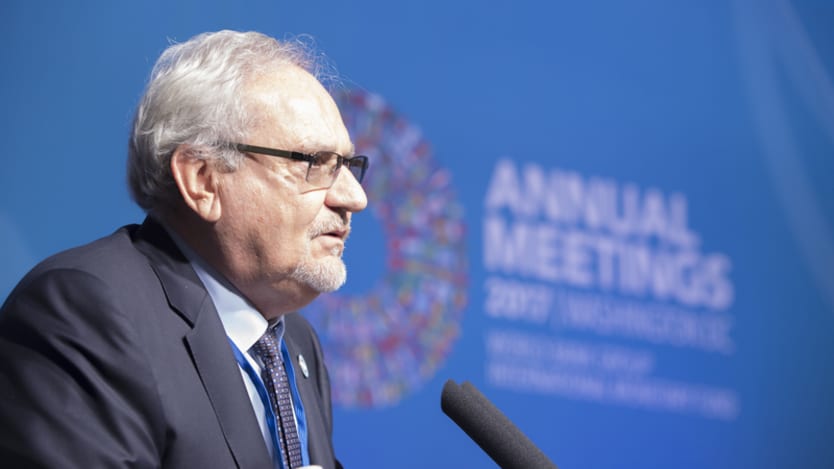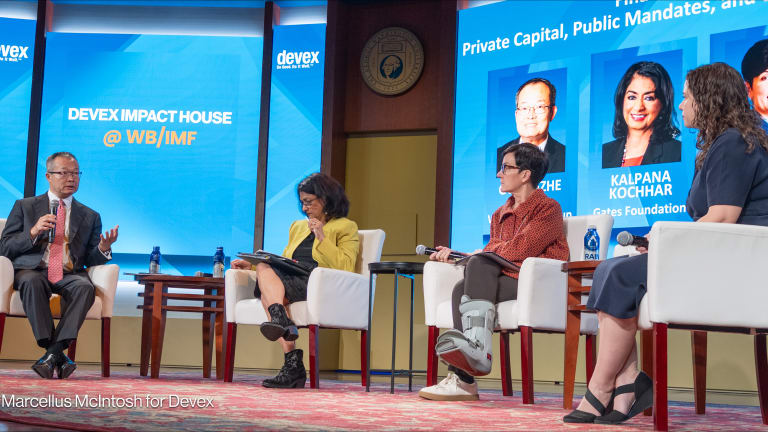
NUSA DUA, Indonesia — Investors have welcomed new guiding principles for impact investing intended to turbocharge the sector — but some question whether the International Finance Corporation, which developed the rules, is the right institution to be leading the effort.
Launched Friday during the World Bank Annual Meetings in Bali, the nine draft principles are part of the bank’s broader push to attract trillions of dollars in private capital to development projects, which they say is the only way of achieving the Sustainable Development Goals.
Impact investing is seen as a critical part of this strategy, with the market currently valued at an estimated $228 billion, a fivefold increase since 2013. Nonetheless, there is a danger this burgeoning sector could be derailed unless clear definitions and guidelines are put in place, according to IFC's CEO Philippe Le Houérou.
IFC hopes the principles will become a “market standard” for the impact investing sector.
“Now is the time — while the market is still young — to develop common principles of how to manage investments for impact,” Le Houérou said during the launch session, adding that without them the sector could be at risk of “impact washing,” where investments with little or no development impact are misclassified as impact investments. This, in turn, could lead to the “total collapse of a possible asset class,” he said.
It is also hoped that the principles will encourage institutional investors — who control approximately $100 trillion in assets globally — to embrace social investing.
Speaking at the launch event on Friday, IFC Vice President Hans Peter Lankes said that drawing impact investors into the development community, with the right “standards and discipline” in place, “should give us a lot of hope that we can achieve progress on the SDGs.”
However, not everyone is convinced impact investing, even if better regulated, will be a force of good for the development sector.
While others questioned the appetite among private financiers to support social projects.
According to an IFC press release, the draft principles “integrate impact-investing considerations into all phases of the investment lifecycle: Strategy, origination and structuring, portfolio management, exit, and independent verification.”
Investors and asset managers say they welcome the draft principles, which were developed in partnership with others in the sector.
In a statement, Andrew Kuper, CEO of LeapFrog Investments, described the principles as an “essential step forward in providing clear guidance to institutional investors” and said they could help address the issue of risk being “mispriced,” which is currently preventing some from embracing impact investing.
Also speaking at the launch event, chairman of Swiss bank UBS Axel Weber said the principles would help address an “urgent need to ensure that ‘impact washing’ is minimized and that true commercial and social outcomes are achieved.”
Banks including Barclays and Bank of America had also recently endorsed the draft, Lankes said.
And Nick O'Donohoe, CEO of the United Kingdom’s development finance institution, CDC, said he especially welcomed the call for “independent verification” in the principles which, “is what makes them different,” he said. However, it will require further thinking, he continued.
“The impact investment industry is ... fragmented … [and] so it is really important as we think about the verification aspect of this that we think about what we’re going to do, how we are going to do it, who is going to do it and how much is it going to cost,” he said.
At the same time, O'Donohoe, who is also a board member of the Global Impact Investing Network, questioned whether IFC was best placed to develop the impact investing regulations.
“It is not necessarily the case that …. everybody [in the impact investing] industry … buys into the fact that IFC should own these principles,” he said, adding that the process of developing the principles, therefore, needs to become “even more collaborative.”
However, UBS’ Weber defended IFC’s role, saying we “have to start somewhere,” while Charles Dallara, from private equity firm Partner Group, said IFC’s reputation meant it was well qualified for the job. “Organizations like mine look up to IFC ... We are delighted to be working under IFC leadership,” he said.
Leapfrog’s Kuper called for institutions to move beyond “petty” points about ownership and come together to develop a final set of principles.
The principles are still in the draft stage, and IFC’s Lankes said he welcomed input from civil society groups and others. The aim is to launch a final version at the next World Bank and IMF meetings in spring 2019.
Catch up on what happened at the World Bank Annual Meetings in Indonesia, where Devex reporters Michael Igoe and Sophie Edwards were on the ground.
Read more from the World Bank Annual Meetings:
► Civil society slams flagship World Bank report on the future of work
► World Bank human capital index — just another ranking?
► World Bank drops support for Kosovo's controversial coal project
► Civil society groups welcome IFC coal plan but push for more
Search for articles
Most Read
- 1
- 2
- 3
- 4
- 5








